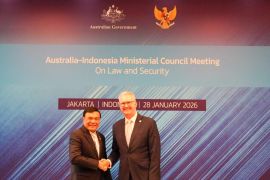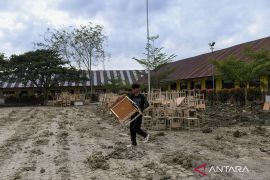"Domestic demand accelerated from 6.35 percent (yoy) in the second quarter of 2018 to 6.40 percent (yoy) in the reporting period, induced by robust investment growth in government infrastructure projects, including building and non-building investment," Agusman noted in a statement received here on Monday.
In contrast, net exports are negative in line with dwindling global demand despite persistently high import growth to meet domestic demand, Agusman remarked.
In turn, negative net exports were a drag on economic growth, which decelerated from 5.27 percent (yoy) in the second quarter of 2018.
Regionally, however, national economic growth was backed by faster growth reported in Java, Sumatra, and Kalimantan.
For this year, therefore, BI projects economic growth at 5.1 percent.
Meanwhile, Indonesia's current account deficit increased in the third quarter of 2018 on stronger domestic demand.
The current account deficit was recorded at US$8.8 billion (3.37 percent of GDP) in the third quarter of 2018, up from $8.0 billion (3.02 percent of GDP) in the previous period.
A growth surge of imports destined to government infrastructure projects, which will boost future economic productivity, has enlarged the current account deficit.
On the other hand, the capital and financial account recorded a significant surplus in the third quarter of 2018, totaling $4.2 billion, backed by an influx of direct investment.
Throughout 2018, current account deficit is projected to remain within a safe threshold, under 3 percent of GDP.
The position of FX reserves stood at $115.2 billion at the end of October 2018, equivalent to 6.4 months of imports or 6.2 months of imports and servicing government external debt, which is well above the international standard of three months, he revealed.
In addition, the rupiah movement remained in line with market mechanism and supporting external sector rebalancing towards economic sustainability.
The rupiah succumbed to depreciatory pressures in the third quarter of 2018 and during October 2018, before rebounding in November 2018.
Point to point, the rupiah depreciated 3.84 percent in the third quarter of 2018 and by 1.98 percent in October 2018 as a corollary of global economic uncertainty.
"The rupiah rebounded in November 2018, however, due to foreign capital inflows to the country, drawn by conducive domestic economic dynamics and financial market policy, as well as positive sentiment surrounding the midterm elections in the US," he added.
The foreign capital inflows affected all financial assets, including the stock market. As of Nov 14, 2018, the rupiah had depreciated by 8.25 percent (ytd) this year, which is less than the depreciation experienced in Turkey, South Africa, India, and Brazil.
BI will remain vigilant of global financial market uncertainty, while continuing to stabilize rupiah exchange rates in line with the currency?s fundamental value and maintaining market mechanisms, backed by financial market deepening efforts.
Reporting by Azis Kurmala
Editing by Rahmad Nasution
Reporter: antara
Editor: Heru Purwanto
Copyright © ANTARA 2018












